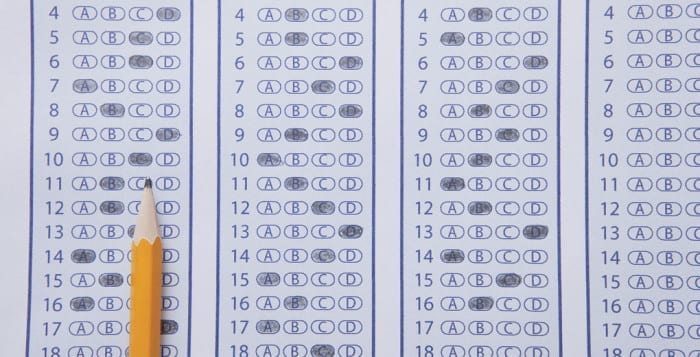Several dozen students will get better grades in algebra after Port Jefferson school officials agreed not to count their final exam scores.
For the 92 students who took algebra this past school year — some of them eighth-graders and some ninth-graders — and sat for the Common Core-aligned Algebra I Regents exam, those test results originally counted for 20 percent of their course grades, according to high school Principal Christine Austen. But the large majority of the kids saw their course grades, and thus their overall GPAs, drop after those test scores were considered.
It was just the second year that the new Algebra I Regents was administered, and Superintendent Ken Bossert said at the school board meeting Monday night the test was not aligned with the Common Core algebra materials and resources the state provided to schools. He said his teachers called the test “unfair,” “brutal” and “rigorous.”
Last year, when the new algebra Regents was administered for the first time, students were also permitted to take the old Integrated Algebra Regents, and use the higher of their two scores on their transcripts. But Bossert said that safety net was not in place this year.
There has been some controversy in Long Island schools over whether districts were allowed to administer the Integrated Algebra test again this year, and let students use the higher of their two scores — some did and some did not. Port Jefferson was one of the districts that did not, and Bossert cited differing interpretations of a state memo to explain the discrepancy.
The memo from the New York State Education Department, dated December 2014, says if students began algebra instruction before September 2014, school districts could choose to administer both tests to those specific kids. Eighth-graders who took the Algebra I Regents this June, for example, would have had to begin algebra instruction in seventh grade in order to qualify.
The memo states the June 2015 exam period was the last time the Integrated Algebra Regents would be administered, ruling out that backup exam for future algebra students.
While Bossert spoke against students in other school districts receiving what he called “an unfair advantage” on their Regents scores, he said Port Jefferson could take some action at least on the local level — recalculating algebra course grades so the Regents exam results did not negatively impact students.
“I believe it’s the right thing to do,” the superintendent said.
Most of the difference in Regents scores between Common Core algebra and Integrated Algebra was in the number of students testing at mastery levels, scoring at least 85 percent.
According to a presentation at Monday’s meeting by Maureen Hull, Port Jefferson’s executive director for curriculum and instruction, 94 percent of Port Jefferson’s test-takers passed the Common Core algebra Regents this year, but only 19 percent scored at the mastery level. In 2014, the first year the new test was administered, those numbers were 90 percent passing and 16 percent mastery — significantly higher than the numbers statewide. But the kids did better on the Integrated Algebra exam that year, with a 95 percent passing rate and a 47 percent mastery rate.
Bossert called the struggle with mastery levels — while other school districts have students who are failing and cannot graduate — “a good problem to have.” But in light of exam difficulty and the discrepancy in how tests were administered, he suggested the district should not count the 2014-15 algebra students’ Regents scores toward their final grades as a “one-time solution,” and in the future reevaluate how final exams should factor into student grades. The board of education unanimously supported the idea.
Austen explained in an interview after the meeting that for the 80 students whose algebra grades dropped due to their Regents scores, school officials would remove the scores from their course grades and recalculate both their final grades and their GPAs.
There were also five students whose saw their grades boosted by their Regents scores and seven who saw no change, Austen said, and those students’ grades will not be touched.




















